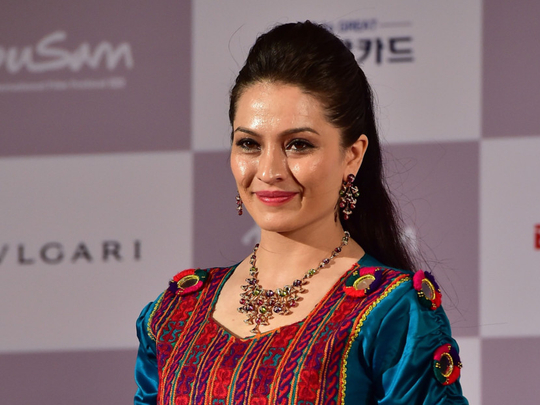
Busan, South Korea: When Marina Gulbahari walked the red carpet on the first night of Asia’s largest film festival, she showed the world more than the colourful traditional Afghan dress she was wearing.
She showed the world the face of women in Afghanistan.
For Afghan women, showing one’s face in public, not to mention on a huge screen, is disliked by conservatives there, even as the fall of the hard-line Islamic Taliban regime allowed women to return to schools, workplaces and even to parliament. Many women still wear a burqa, the clothing that covers women from head to toe with a mesh panel over the face.
So walking the red carpet and co-hosting the opening event at the 20th annual Busan International Film Festival was a big step not only for the 23-year-old Gulbahari but for her compatriots.
“For the moment, living in Afghanistan is difficult for normal people. For women who are working as an actress, it’s more dangerous for them,” she said in an interview translated by her husband, Noorullah Azizi, who works in movie and TV production in Afghanistan. “About some years ago [I] got some warnings from the Taliban that you cannot work. If you appear again, we will kill you.”
Although little known outside the festival circle, Gulbahari is already part of movie history in her country. Her first role was as a young girl who had to be disguised as a boy to support her female-only household in Osama. It was Afghanistan’s first post-Taliban movie and it won the Golden Globe prize for best foreign film in 2003.
Like the young girl she played, Gulbahari’s family needed her to support her parents and her seven siblings when she was young. When she was discovered by Siddiq Barmak, director of Osama, she was a teenager selling magazines at a park in Kabul, worrying about how to help feed her family.
“What can I do to support my family?” she said. “It was [my] goal to find something to bring home.”
Although Gulbahari never went to acting school, those moments in her life provided lessons that acting schools could not.
“I have experiences. Tragic experiences,” she said with a beaming smile.
Although she is now a big star in Afghanistan, she “never” thought she would become an actress.
The first movie she saw was Titanic, watching a videotape copy when she was nine years old even though the movie was banned under the Taliban.













